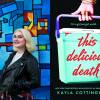With robots, pirates and witches, LGBTQ+ authors are making their mark in the fantasy genre. Maximizing the endless possibilities of magical realms, these authors say they can create safe worlds devoid of prejudices, such as homophobia and transphobia, opening a universe where readers can discover themselves along the way.

For author Gabe Cole Novoa, he had to write as a way to find — and see — himself.
The Massachusetts-based writer realized he was queer through writing fiction.
“Writing gave me a place initially to kind of safely explore the question that wasn't necessarily welcoming for me to work out aloud,” he said. By giving his characters struggles with their own gender identity, he was able to come out as transgender.
His latest young adult fantasy release, “The Wicked Bargain,” features the story of a transmasculine nonbinary pirate on a mission of revenge, redemption and revolution in a deal gone wrong with the devil.
Now, his readers reach out to him, telling him how his books were the first time they truly saw themselves represented.
For Adrienne Tooley, rather than employ the adage “write what you know,” she decided to write who you want to know — and see.
Tooley grew up a reader of fantasy — but never encountered two women falling in love in the genre. Now she’s writing the books she wishes were available for her back then, including her latest sapphic young adult fantasy, “The Third Daughter.”

“Especially as a teenager, there are opportunities to identify with a character in a book that you otherwise wouldn't have had access to,” she said. “That helps you unlock something about your own heart, that's so important and so special to me.”
As Tooley points out, access is everything.
LGBTQ+ books were often long relegated to back shelves — but now these books are making waves in the market. Sales of LGBTQ+ fiction in the U.S. reached an all time high according to market research company Circana — between May 2022 and May 2023, 6.1 million LGBTQ+ fiction books were sold — an 11% increase from the previous year, and a 173% increase from 2019.
There’s a market and dedicated audience for queer fantasy books and authors are filling the shelves. Among them is Lana Harper, an alumna of Boston University and Emerson College, who is behind “Witches of Thistle Grove,” a romance series set in a fictional town inspired by Salem.
Harper, who is bisexual, wanted to see her identity represented in her books. The first in the series, “Payback’s a Witch,” was a hit — and was the first title from Berkley Books featuring a sapphic couple to break into the New York Times bestseller list. Now, her series is being developed into a television show.

“Lesbian romances specifically tend to be shunted to the side a little bit more than gay romances with men,” she said. “So the notion of something with a broad viewership where that female relationship is centered, it's the show that I was always looking for.”
New York Times best-selling author, Samantha Shannon, has also sought to see herself on the page.
In her latest book “A Day of Fallen Night,” she’s made representation a priority, as the book features two lesbian relationships — one between two women who have been together for 30 years.
“I do feel like it's important with queer characters to show that there is a future, especially because we had ‘bury your gays’ for so long, where you just had sort of gay characters dying very young or in tragic circumstances,” she said. “Showing characters growing old together and having a really strong relationship, it can be very powerful.”
While these authors agree that representation can be powerful, there is also power in showing these characters through more unconventional means.

Swampscottt-based author Kit Vincent, who is third gender and uses all pronouns, has taken a different route into publishing their books — forsaking the traditional industry and independently publishing their books on their own.
“When I released it, there was such a passionate queer community on TikTok and on Instagram and like a lot of people supported my book and really liked it,” Vincent said. “We kind of all support each other and put it out in the world and let it sail.”
Vincent’s debut novel, “Of Feathers and Thorns” is set in an alternative 1900s America — where not only magic exists, but there is no discrimination towards the LGBTQ+ community. Their latest release, “Us, Et Cetera,” features two artificial intelligence robots who fall in love while working for a wealthy family in Boston. While the robots face discrimination and are viewed as lesser for not being human, their sexualities are not an issue in the fictional world.
@kitvincentbooks Grab the tissues, Us, Et Cetera is coming! 💖🤖🏳️🌈🤖 So excited to share my queer Cinderella x The Matrix with you guys! Fair warning: there are lots of feels in this one. So be prepared! 😂💖#lgbtqbooks #booktok #authorsoftiktok #usetcetera #authortok #mlm #lgbtfantasybook #gaybookrecommendation #lgbtqscifi ♬ original sound - Kit Vincent 🌈
Though this genre of fantasy fiction can create a safe space for the LGBTQ+ community, actions sometimes speak louder than words.
Not only are attacks against the LGBTQ+ community on the rise, but LGBTQ+ books are being banned across the country. It is in this climate that authors want their words to be louder than anti-LGBTQ actions. Authors say they feel an urgency for young readers to see their identities reflected in the books that they read.
“Here's the thing about not allowing queer teens to see themselves represented: it doesn't stop them from being queer,” Novoa, “The Wicked Bargain,” author said. “It just puts them in a space where they feel alone or they feel that they can reach out to other people or they can't tell anyone.”
But, writers aren’t letting the opposition stop them — if anything, it fuels their commitment to publishing LGBTQ+ fantasy.
“Any time there's that kind of repression, you have to be just as bullish in your push back,” Harper, the “Witches of Thistle Grove” author said. “They can't ban everything. So the more of this material exists, the more you're showing readers that this is perfectly acceptable. It's a wonderful thing to be interested in. It's a demonstration of courage.”








